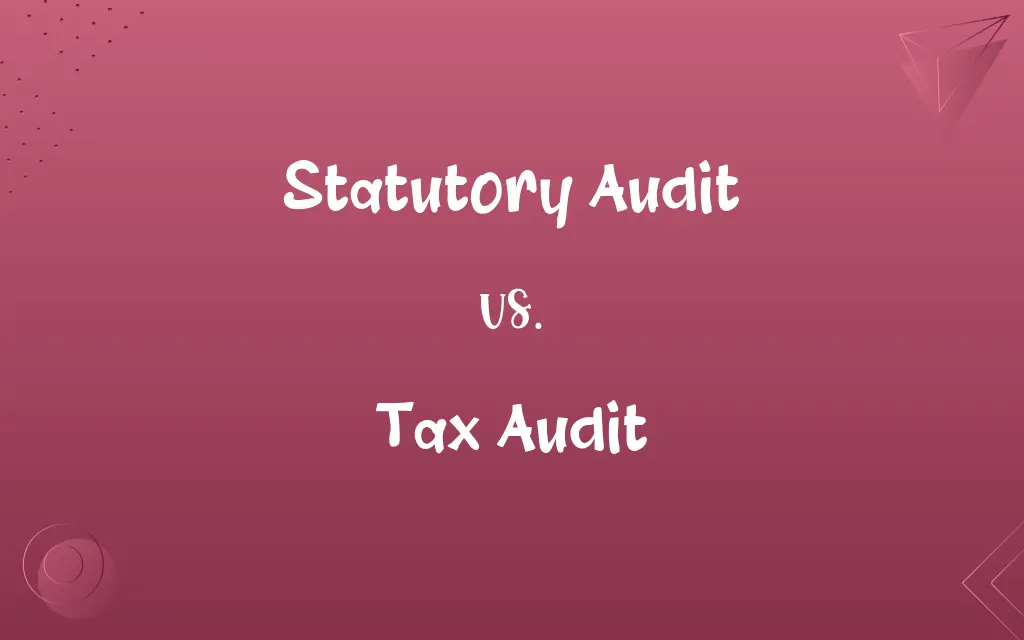Statutory Audit vs. Tax Audit: Know the Difference

By Shumaila Saeed || Published on January 27, 2024
A statutory audit is a legally required review of the accuracy of a company's financial statements; a tax audit is an examination of a company's tax returns by the tax authorities.

Key Differences
A statutory audit is mandated by law, primarily to verify the accuracy of a company's financial records and ensure compliance with accounting standards and regulations. In contrast, a tax audit, conducted by tax authorities, focuses on ensuring the accuracy and completeness of a company's tax returns and compliance with tax laws.
Shumaila Saeed
Jan 27, 2024
The purpose of a statutory audit is to provide assurance to shareholders, investors, and other stakeholders about the financial health and integrity of a company. A tax audit aims to ensure that the company is paying the correct amount of taxes and is not engaging in tax evasion or avoidance.
Shumaila Saeed
Jan 27, 2024
During a statutory audit, auditors review a wide range of financial documents including balance sheets, income statements, and cash flow statements. In a tax audit, the scrutiny is more on tax-related documents, such as income tax returns, deductions, credits, and related financial records.
Shumaila Saeed
Jan 27, 2024
The outcome of a statutory audit can affect investor confidence, credit ratings, and a company's reputation. The outcome of a tax audit can lead to adjustments in tax liabilities, penalties, or, in some cases, legal consequences for tax fraud.
Shumaila Saeed
Jan 27, 2024
Statutory audits are usually conducted annually, while tax audits may not occur as regularly and can be triggered by discrepancies or random selection by tax authorities.
Shumaila Saeed
Jan 27, 2024
ADVERTISEMENT
Comparison Chart
Purpose
To verify financial records and compliance with accounting laws.
To ensure accuracy and compliance of tax returns with tax laws.
Shumaila Saeed
Jan 27, 2024
Focus Area
Financial statements like balance sheets, income statements.
Tax returns, deductions, tax credits, and related records.
Shumaila Saeed
Jan 27, 2024
Regulatory Compliance
Mandated by various laws depending on jurisdiction.
Governed by the country's tax laws and regulations.
Shumaila Saeed
Jan 27, 2024
Frequency
Usually conducted annually.
Conducted irregularly, possibly triggered by discrepancies.
Shumaila Saeed
Jan 27, 2024
Impact on Company
Affects investor confidence and reputation.
Impacts tax liabilities and can lead to legal consequences.
Shumaila Saeed
Jan 27, 2024
ADVERTISEMENT
Statutory Audit and Tax Audit Definitions
Statutory Audit
Statutory audit assesses the accuracy and fairness of a company's financial statements.
After the statutory audit, the firm received a clean chit for its accounting practices.
Shumaila Saeed
Jan 07, 2024
Tax Audit
A tax audit is an examination of a company's tax returns by tax authorities.
The company faced a tax audit after reporting unusually high deductions.
Shumaila Saeed
Jan 07, 2024
Statutory Audit
A statutory audit is a legally required review of a company's financial records.
The company underwent a statutory audit to ensure financial transparency.
Shumaila Saeed
Jan 07, 2024
Tax Audit
Tax audit involves a thorough scrutiny of financial transactions and records.
The tax audit revealed several unaccounted transactions in the company's books.
Shumaila Saeed
Jan 07, 2024
Statutory Audit
Statutory audit is essential for investor confidence and regulatory compliance.
The statutory audit results were crucial for the company's stock market listing.
Shumaila Saeed
Jan 07, 2024
ADVERTISEMENT
Tax Audit
Tax audit ensures compliance with tax laws and accuracy of tax payments.
The tax audit resulted in additional tax liabilities for the previous fiscal year.
Shumaila Saeed
Jan 07, 2024
Statutory Audit
Statutory audits provide assurance on the integrity of financial information.
The annual statutory audit verified the company's reported profits.
Shumaila Saeed
Jan 07, 2024
Tax Audit
A tax audit reviews the correctness of income, deductions, and credits claimed.
During the tax audit, discrepancies in reported income were identified.
Shumaila Saeed
Jan 07, 2024
Statutory Audit
A statutory audit is conducted to comply with financial reporting standards.
The statutory audit highlighted the need for better internal financial controls.
Shumaila Saeed
Jan 07, 2024
Tax Audit
Tax audits are conducted to prevent tax evasion and ensure fair tax practices.
The IRS conducted a tax audit to investigate potential underreporting of income.
Shumaila Saeed
Jan 07, 2024
Repeatedly Asked Queries
How long does a tax audit take?
The duration of a tax audit varies depending on the complexity of the case.
Shumaila Saeed
Jan 27, 2024
What triggers a tax audit?
Tax audits can be triggered by discrepancies in tax returns or randomly selected by tax authorities.
Shumaila Saeed
Jan 27, 2024
Who conducts a statutory audit?
A statutory audit is conducted by independent external auditors.
Shumaila Saeed
Jan 27, 2024
Can a tax audit lead to criminal charges?
Yes, if tax fraud or evasion is uncovered, it can lead to criminal charges.
Shumaila Saeed
Jan 27, 2024
What is the main objective of a statutory audit?
The main objective is to verify the accuracy and fairness of a company's financial statements.
Shumaila Saeed
Jan 27, 2024
Who appoints the statutory auditor?
The statutory auditor is typically appointed by the shareholders of the company.
Shumaila Saeed
Jan 27, 2024
Are small businesses subject to tax audits?
Yes, small businesses can also be subject to tax audits.
Shumaila Saeed
Jan 27, 2024
Is a statutory audit mandatory for all companies?
It depends on the jurisdiction and specific laws, but it's generally required for public and large companies.
Shumaila Saeed
Jan 27, 2024
What documents are needed for a tax audit?
Tax returns, financial statements, receipts, and other relevant financial records.
Shumaila Saeed
Jan 27, 2024
What industries are most likely to undergo statutory audits?
Industries like banking, insurance, and public companies are commonly subject to statutory audits.
Shumaila Saeed
Jan 27, 2024
Are statutory audit reports public?
For public companies, statutory audit reports are usually made public.
Shumaila Saeed
Jan 27, 2024
Can errors in a tax audit be appealed?
Yes, findings in a tax audit can be contested or appealed.
Shumaila Saeed
Jan 27, 2024
What happens if discrepancies are found in a statutory audit?
Discrepancies can lead to financial restatements and potentially legal consequences.
Shumaila Saeed
Jan 27, 2024
Can individuals be subject to a tax audit?
Yes, individuals can be audited, especially if there are unusual deductions or income discrepancies.
Shumaila Saeed
Jan 27, 2024
What are the consequences of failing a tax audit?
Consequences can include additional taxes, penalties, and interest charges.
Shumaila Saeed
Jan 27, 2024
What is the difference between internal and statutory audit?
An internal audit is conducted by the company’s staff, while a statutory audit is by external auditors.
Shumaila Saeed
Jan 27, 2024
Does a statutory audit evaluate operational efficiency?
Its primary focus is financial records, but it may indirectly touch on operational aspects.
Shumaila Saeed
Jan 27, 2024
Can a company refuse a statutory audit?
No, if legally required, a company cannot refuse a statutory audit.
Shumaila Saeed
Jan 27, 2024
How often do tax audits occur?
The frequency varies and can be random or based on specific triggers.
Shumaila Saeed
Jan 27, 2024
Does a tax audit always result in penalties?
Not always; if discrepancies are minor or unintentional, penalties may be waived or reduced.
Shumaila Saeed
Jan 27, 2024
Share this page
Link for your blog / website
HTML
Link to share via messenger
About Author
Written by
Shumaila SaeedShumaila Saeed, an expert content creator with 6 years of experience, specializes in distilling complex topics into easily digestible comparisons, shining a light on the nuances that both inform and educate readers with clarity and accuracy.









































































